|
    
The
Train
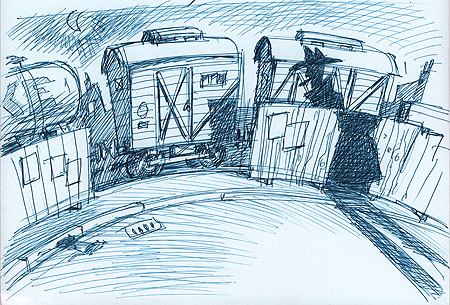 |
|
|
|
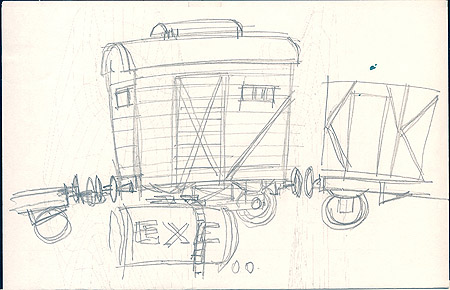 |
|
This
drawing on the top left was the basis
for the Cargo train shot. I felt I
needed more distorted sets, so I draw
at one summer coffee break four different
impressions, of street sets, with
agent's shadows at night. Four of
them on one sheet of office paper.
The thing with this kind of distorted
models is that they are much more
complicated to execute. But, this
was among the last shots I did, and
I was little bit more relaxed (it
wouldn't be such a big tragedy if
I don't pull it off) so I followed
my first instinct to do it (as I did
with all four sets) as close as possible
to the drawing. It was possible only
because I already had the most demanding
thing: the curvy base, fundation for
tracks: it's the same one, or - to
be precise - half base of the Orphanage
set, originally. I've already used
it for two previous street sets /
shots. So, when I adjusted it in camera
to match the drawing, building the
rest wasn't that hard. Tracking imaginary
lines in the mid-air is never simple
(checking monitor wasn't that easy
as it could be), also this method
is complete opposite of drawing by
the model. Nevertheless, I have experience
in this things, so it worked well
enough. It may seem I'm a unneccessary
sticker for details, but in this things
you can follow the design and save
time later, or, you can produce simple
sets and models and only then start
to search for shots, camera angles
and so on. That way, you can find
more camera angles than you actually
need, which can put you in undecisive
spot, or you can find that the best
angle is the one where some of the
models show their unfinished side,
or nothing looks good, so you have
to work further to make it work...
As I said, I wanted this drawing,
so in a way, the simplest thing was
to stick to it. And the cheapest.
How so? Well, I had to make only two
(and half)sides of every train car,
so everything is just a facade, really.
It could slide on tracks, but it's
a facade at the bottom line. Also
the only thing somewhat complicated
was to find measures of objects, as
I already mentioned - in the mid air,
but there are ways to do that. Details?
Contrary to the beleif, details for
me are easiest to make. They are just
like icing on a cake. Also, when it
came time for details, that means
that everything else is set, so detasils
are final touch, something fun to
do, a reward at he end. Well, in this
case, anyway.
|
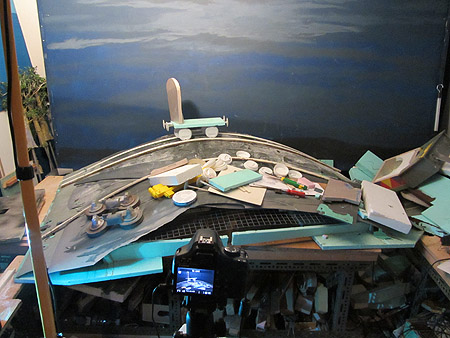 |
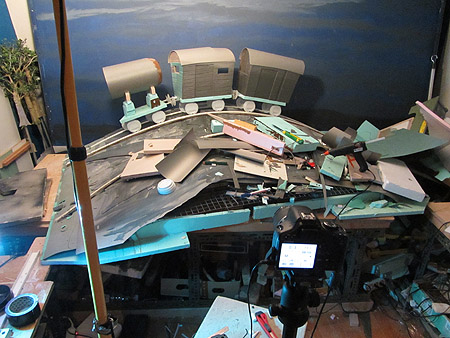 |
|
|
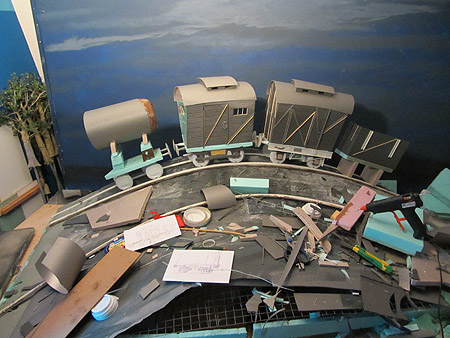 |
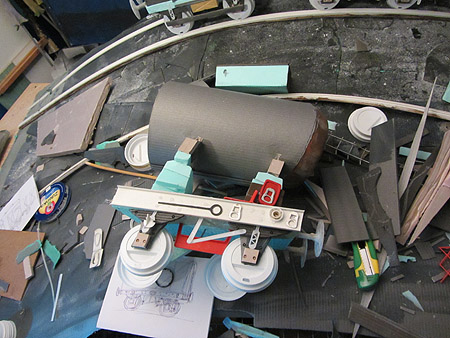 |
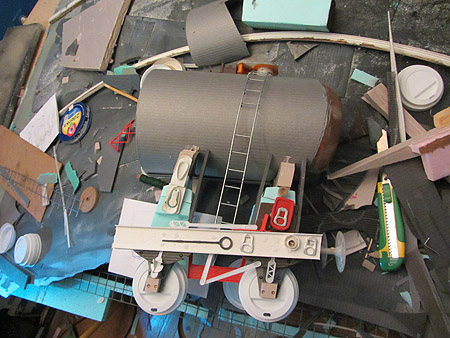 |
|
|
|
|
|
|
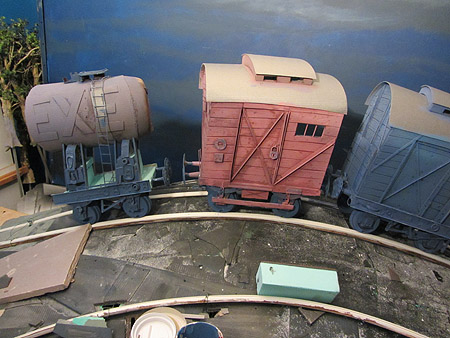 |
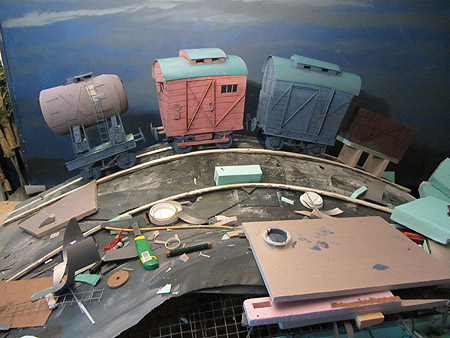 |
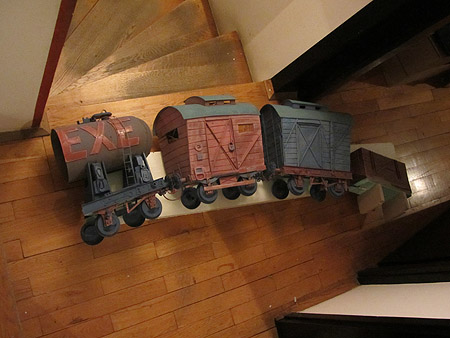 |
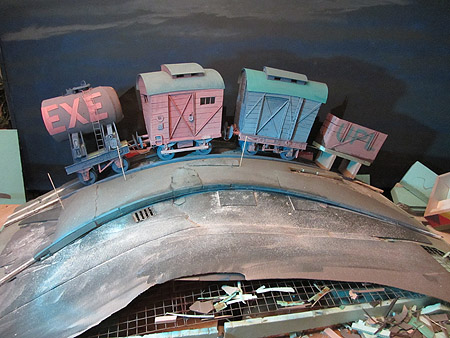 |
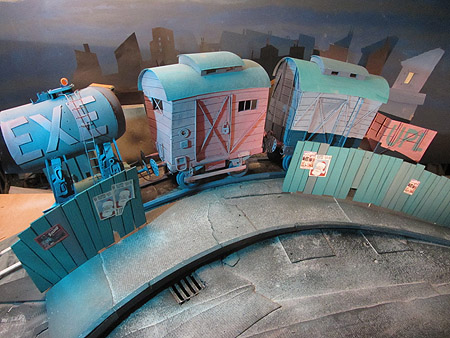 |
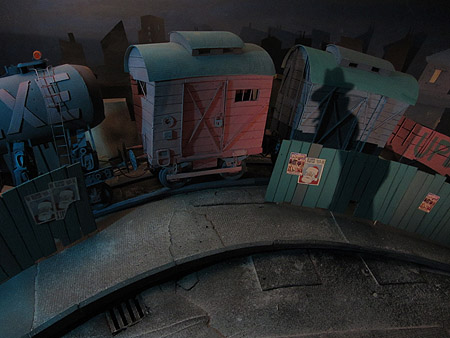 |
|
Another benefit of sticking to the drawing
was the ability to pre-conceive the
agent's shadow even before I started
making actual train cars, or facades
of it. But, there are always problems
with lighting on such small sets. I
have, maybe, pre-concieved the shadow,
but I didn't check all the aspects about
how is this going to affect the overall
scene. In such night scenes low sources
of light produce high shadows, which
affect the background. I had to re-think
everything, to move everything. I had
to move the set further away from the
background sky, and to move the camera
with it, loosing already perfect position
(aligned to the set from the beggining
- because the set was built to fit the
camera view). And the most important
of all, I had to move cutouts for agent's
shadows on higher positions, light for
them on even higher elevation, to lower
the aiming of that light... |
| |
| _1
The ARCTIC PIRATE index |
| _2
Color chart development, coloring and
light tests |
| _3
Storyboards, shooting plans, concept
arts, sketches |
| _4
Puppets, from sketches to animation |
| _5
Vehicles of all sorts: 5-E - Train |
| _6
Houses and exteriors, from sketches
to final sets |
| _7
Interiors |
| _8
Small props |
| _9
Graphics and maps for posters, banners,
press, signs etc. |
| 10
Shots against all odds |
| 11
Simple shots, confined spaces |
| 12
Basics: workbenches, tools, logistics,
etc. |
| 13
Miscellaneous |
| |
    
|